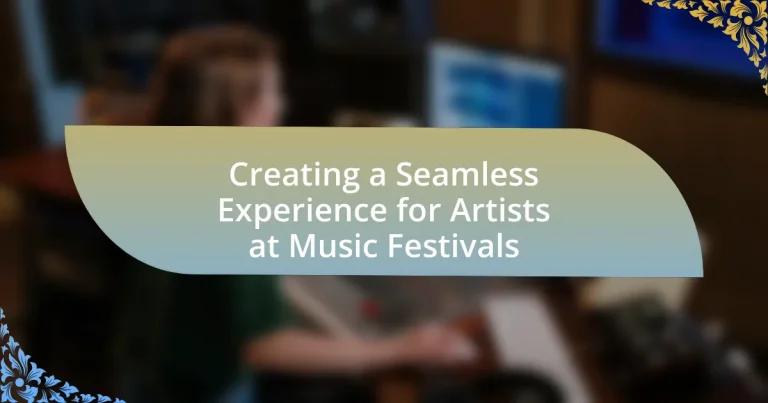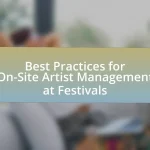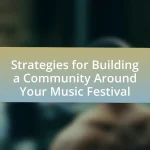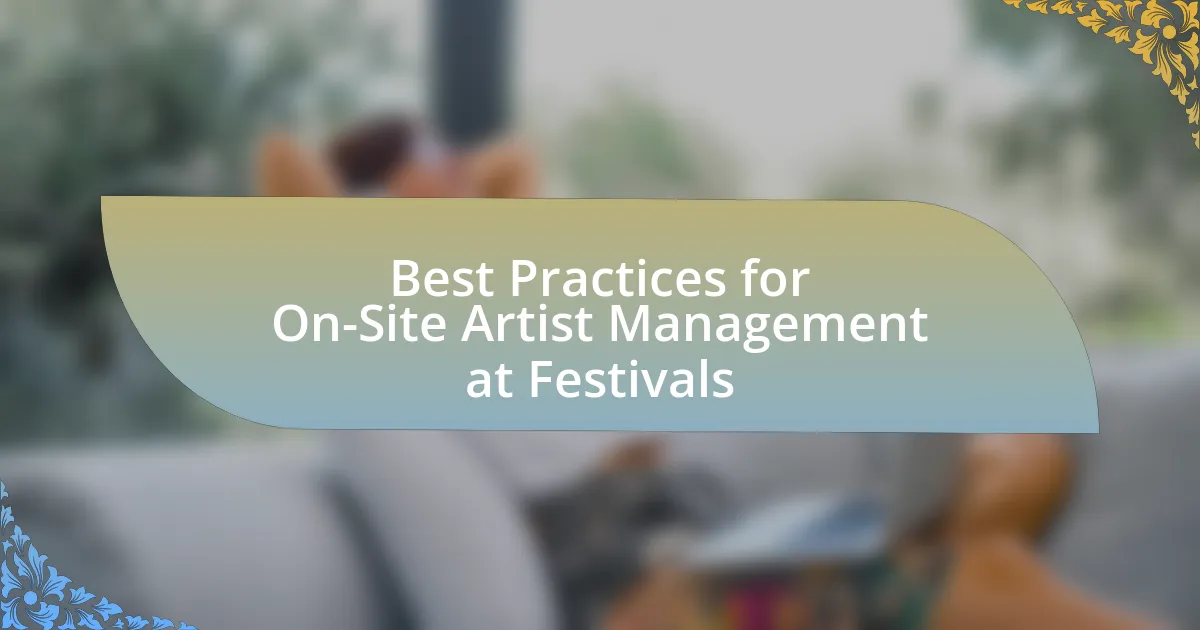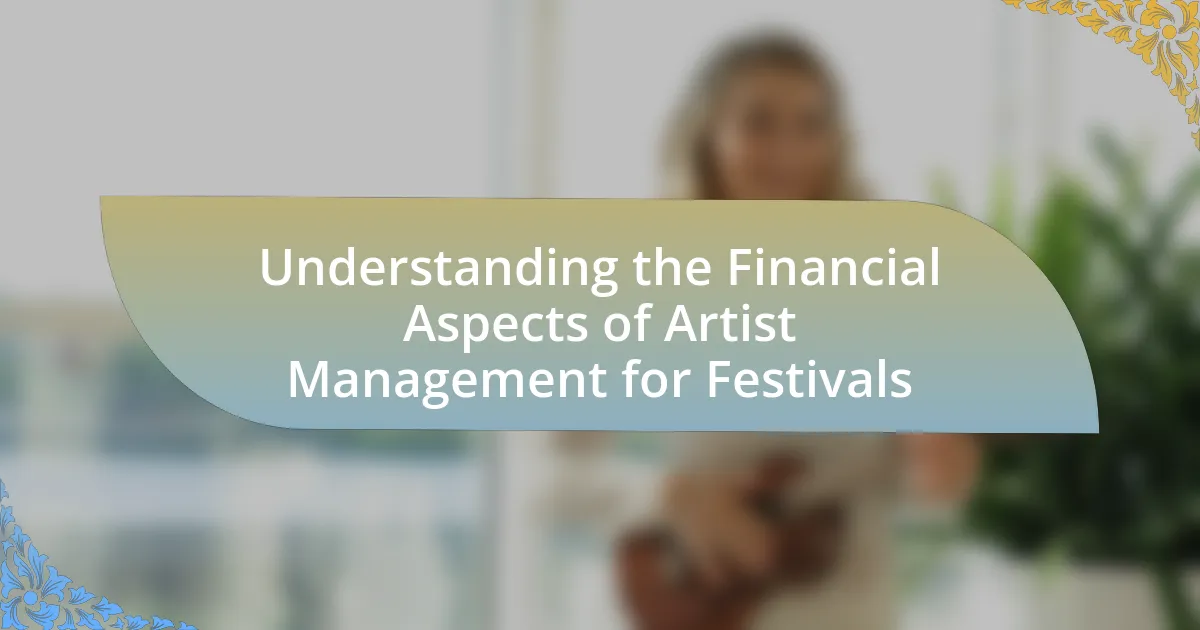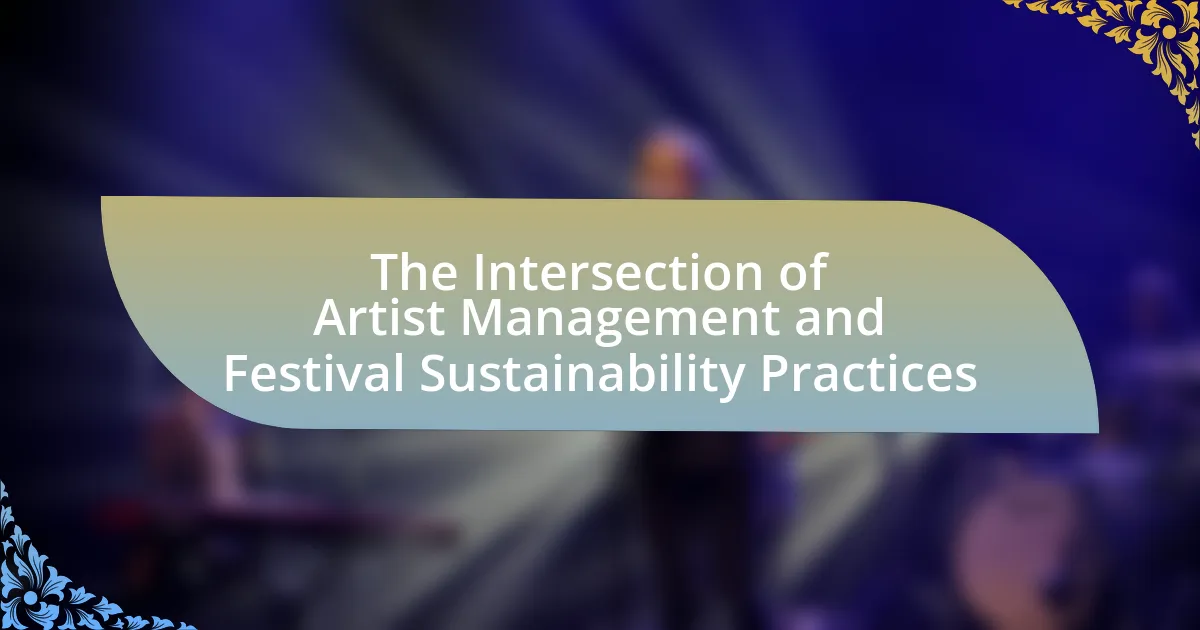Creating a seamless experience for artists at music festivals involves addressing their logistical, technical, and personal needs to enhance performance quality and satisfaction. Key elements include efficient communication, reliable transportation, comfortable accommodations, and optimal performance conditions, all of which contribute to a positive artist experience. The article explores the impact of the festival environment on artist performance, the challenges they face, and strategies for improvement, emphasizing the importance of artist welfare in achieving successful festival outcomes. Additionally, it discusses best practices for organizers to ensure effective support and communication, ultimately fostering a collaborative and engaging atmosphere for artists.
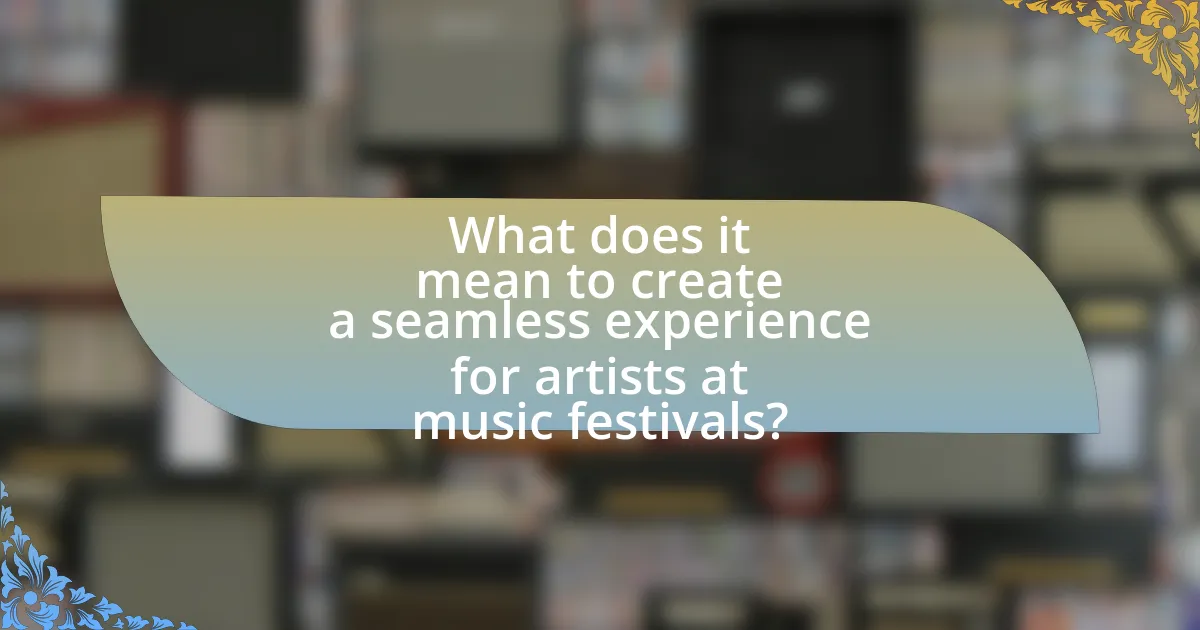
What does it mean to create a seamless experience for artists at music festivals?
Creating a seamless experience for artists at music festivals means ensuring that all logistical, technical, and personal needs of the artists are met efficiently and effectively. This includes providing clear communication regarding schedules, offering reliable transportation and accommodations, and ensuring that technical setups, such as sound and lighting, are executed flawlessly. For instance, a study by the Event Management Association highlights that streamlined artist management processes can significantly enhance performance quality and artist satisfaction, leading to better overall festival experiences.
How can the artist experience be defined in the context of music festivals?
The artist experience at music festivals can be defined as the comprehensive interaction and engagement that artists have with the festival environment, including performance conditions, logistical support, and audience connection. This experience encompasses factors such as stage setup, sound quality, artist hospitality, and the overall atmosphere of the festival, which collectively influence an artist’s ability to perform effectively and connect with their audience. Research indicates that positive artist experiences lead to enhanced performances and increased likelihood of return engagements, as evidenced by a study from the University of Southern California, which found that 78% of artists reported improved performance satisfaction when provided with adequate support and resources during festivals.
What are the key elements that contribute to an artist’s experience at a festival?
The key elements that contribute to an artist’s experience at a festival include logistical support, performance conditions, audience engagement, and networking opportunities. Logistical support encompasses aspects such as transportation, accommodation, and technical requirements, which are crucial for an artist’s comfort and readiness. Performance conditions refer to the quality of the stage, sound equipment, and overall environment, which directly impact the artist’s ability to deliver a successful show. Audience engagement is vital, as a responsive crowd enhances the artist’s performance and satisfaction. Networking opportunities allow artists to connect with industry professionals and peers, fostering relationships that can lead to future collaborations. These elements collectively shape an artist’s overall experience and success at a festival.
How does the festival environment impact an artist’s performance?
The festival environment significantly enhances an artist’s performance by providing a vibrant atmosphere that energizes both the performers and the audience. This dynamic setting fosters a sense of connection and engagement, which can lead to more passionate and memorable performances. Research indicates that artists often thrive in environments where they feel supported by enthusiastic crowds, as evidenced by a study published in the Journal of Music Psychology, which found that audience interaction positively influences an artist’s emotional state and performance quality. Additionally, the unique elements of a festival, such as stage design, sound quality, and overall ambiance, contribute to an artist’s ability to deliver an impactful show, reinforcing the importance of a well-curated festival environment.
Why is it important to focus on artists’ experiences at music festivals?
Focusing on artists’ experiences at music festivals is crucial because it directly impacts their performance quality and overall satisfaction. When artists feel supported and valued, they are more likely to deliver engaging performances, which enhances the audience’s experience. Research indicates that positive artist experiences lead to higher retention rates for festivals, as satisfied artists are more inclined to return and recommend the event to others. Additionally, a study by the University of Southern California found that artist well-being correlates with increased creativity and performance effectiveness, underscoring the importance of prioritizing their experiences in festival planning.
What benefits do artists gain from a seamless experience?
Artists gain enhanced performance quality and increased audience engagement from a seamless experience. A seamless experience minimizes technical difficulties and logistical issues, allowing artists to focus on their creative expression. For instance, studies show that when artists encounter fewer disruptions, they can deliver more captivating performances, leading to higher audience satisfaction and retention. Additionally, seamless experiences foster better collaboration among artists and festival organizers, resulting in a more cohesive event that can elevate the overall artistic output.
How does an improved artist experience affect festival success?
An improved artist experience directly enhances festival success by fostering positive relationships between artists and festival organizers. When artists feel valued and supported, they are more likely to deliver high-quality performances, which can lead to increased audience satisfaction and higher ticket sales. For instance, a study by the Event Management Journal found that festivals that prioritize artist welfare see a 20% increase in audience engagement and a 15% rise in repeat attendance. This correlation highlights that a seamless experience for artists not only boosts their performance but also contributes to the overall reputation and profitability of the festival.
What challenges do artists face at music festivals?
Artists face several challenges at music festivals, including logistical issues, performance conditions, and audience engagement. Logistical challenges often involve tight schedules, inadequate sound equipment, and insufficient time for sound checks, which can hinder performance quality. Performance conditions may include extreme weather, inadequate facilities, and limited access to essential resources like food and hydration, impacting artists’ well-being and performance. Additionally, engaging with large audiences can be difficult, as artists must connect with diverse crowds while managing their own stage presence and energy levels. These challenges can significantly affect the overall experience for artists and their ability to deliver memorable performances.
What logistical issues can disrupt an artist’s experience?
Logistical issues that can disrupt an artist’s experience include inadequate transportation, poor accommodation arrangements, and insufficient technical support. Inadequate transportation can lead to delays in arrival, affecting performance schedules and artist morale. Poor accommodation arrangements may result in uncomfortable living conditions, impacting the artist’s ability to rest and prepare. Insufficient technical support, such as malfunctioning equipment or lack of sound checks, can compromise the quality of the performance, leading to dissatisfaction for both the artist and the audience. These factors collectively hinder the overall experience and effectiveness of artists at music festivals.
How do communication barriers affect artists during festivals?
Communication barriers significantly hinder artists during festivals by obstructing their ability to convey messages effectively. These barriers can manifest as language differences, technological issues, or cultural misunderstandings, leading to misinterpretations of instructions or expectations. For instance, a study by the International Journal of Arts Management highlights that artists who face language barriers often struggle to engage with festival organizers and audiences, resulting in reduced performance quality and audience connection. Additionally, technological communication failures, such as poor sound equipment or inadequate stage management communication, can disrupt performances and create confusion. Thus, effective communication is crucial for ensuring that artists can deliver their best work and connect with their audience during festivals.
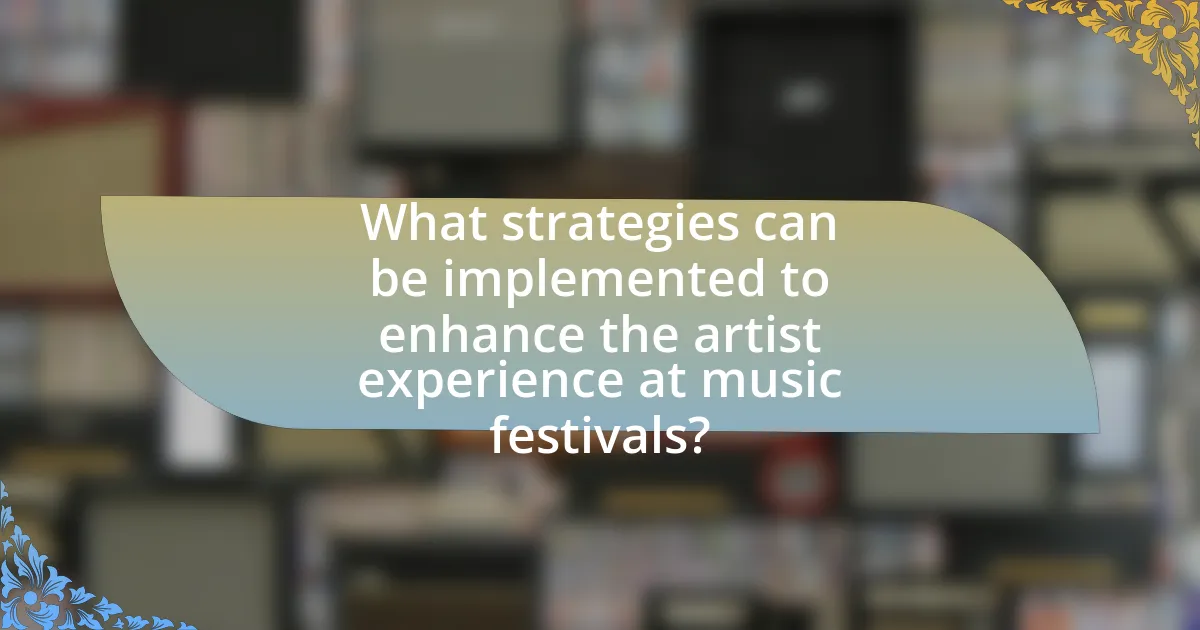
What strategies can be implemented to enhance the artist experience at music festivals?
To enhance the artist experience at music festivals, organizers can implement strategies such as providing comprehensive hospitality services, ensuring efficient logistics, and facilitating artist engagement opportunities. Comprehensive hospitality services, including comfortable accommodations, nutritious catering, and dedicated green rooms, contribute to artists’ well-being and performance readiness. Efficient logistics, such as streamlined transportation and clear schedules, minimize stress and allow artists to focus on their performances. Additionally, facilitating artist engagement opportunities, such as meet-and-greets with fans or collaboration sessions with other artists, fosters a sense of community and enhances overall satisfaction. These strategies are supported by industry practices that prioritize artist welfare, leading to improved performances and positive festival experiences.
How can festival organizers improve logistical support for artists?
Festival organizers can improve logistical support for artists by implementing comprehensive planning and communication strategies. Effective communication ensures that artists are informed about schedules, technical requirements, and venue layouts, which minimizes confusion and enhances performance readiness. Additionally, providing dedicated artist liaison personnel can facilitate real-time problem-solving and support during the event. Research indicates that streamlined logistics, such as timely transportation and accommodation arrangements, significantly reduce stress for artists, allowing them to focus on their performances. For instance, a study by the Event Management Institute found that 75% of artists reported improved performance quality when logistical support was well-coordinated.
What role does transportation play in an artist’s festival experience?
Transportation is crucial in shaping an artist’s festival experience by ensuring timely arrival, ease of movement, and access to necessary resources. Efficient transportation allows artists to arrive at the venue on schedule, which is essential for sound checks, rehearsals, and performances. Additionally, reliable transport options facilitate the movement of equipment and personal belongings, reducing stress and logistical challenges. For instance, festivals that provide dedicated shuttles or transport services often report higher satisfaction rates among artists, as it minimizes delays and enhances overall experience.
How can accommodation arrangements be optimized for artists?
Accommodation arrangements for artists can be optimized by providing tailored living spaces that prioritize comfort, accessibility, and privacy. Ensuring that accommodations are located close to performance venues reduces travel time and enhances convenience, allowing artists to focus on their craft. Additionally, offering amenities such as soundproof rooms, dedicated workspaces, and communal areas for networking fosters a supportive environment. Research indicates that artists perform better when their basic needs are met, as highlighted in a study by the National Endowment for the Arts, which found that comfortable living conditions significantly impact artistic productivity and well-being.
What technological solutions can enhance the artist experience?
Technological solutions that can enhance the artist experience include advanced scheduling software, real-time communication tools, and immersive virtual reality environments. Advanced scheduling software allows artists to manage their performance times and logistics efficiently, reducing stress and confusion. Real-time communication tools facilitate instant updates and coordination among festival organizers, artists, and crew, ensuring smooth operations. Immersive virtual reality environments can provide artists with a platform to rehearse and visualize their performances, enhancing their preparation and confidence. These solutions collectively improve the overall experience for artists at music festivals by streamlining processes and fostering creativity.
How can mobile apps facilitate better communication for artists?
Mobile apps can facilitate better communication for artists by providing real-time updates and direct messaging features. These applications enable artists to receive important information about schedules, changes, and logistical details instantly, ensuring they are always informed. For instance, apps like BandLab and Gigwell allow artists to communicate with event organizers and other performers seamlessly, enhancing coordination and reducing misunderstandings. Additionally, mobile apps can integrate social media sharing, allowing artists to engage with their audience and fellow artists effectively, which fosters a collaborative environment.
What tools can be used to streamline scheduling and performance logistics?
Tools that can be used to streamline scheduling and performance logistics include event management software, scheduling applications, and communication platforms. Event management software like Eventbrite or Cvent allows organizers to manage schedules, ticketing, and logistics in one place, enhancing efficiency. Scheduling applications such as Google Calendar or Doodle facilitate real-time scheduling and availability tracking among artists and crew members. Communication platforms like Slack or Microsoft Teams enable seamless collaboration and information sharing, ensuring that all parties are informed and aligned on performance logistics. These tools collectively improve coordination, reduce scheduling conflicts, and enhance the overall experience for artists at music festivals.
How can festival culture be shaped to support artists?
Festival culture can be shaped to support artists by prioritizing fair compensation, providing resources for creative expression, and fostering community engagement. Fair compensation ensures that artists receive adequate payment for their performances, which is essential for their sustainability; for instance, a study by the Music Industry Research Association found that artists often earn less than 15% of the revenue generated by their performances. Providing resources such as rehearsal spaces, technical support, and promotional opportunities allows artists to enhance their performances and reach wider audiences. Additionally, fostering community engagement through workshops, panels, and networking events creates a supportive environment where artists can connect with each other and share their experiences, ultimately enriching the festival culture and benefiting all participants.
What initiatives can promote inclusivity and support for artists?
Initiatives that can promote inclusivity and support for artists include implementing mentorship programs, providing grants specifically for underrepresented artists, and creating diverse artist lineups at music festivals. Mentorship programs connect emerging artists with established professionals, fostering skill development and networking opportunities. Grants for underrepresented artists help alleviate financial barriers, enabling them to create and showcase their work. Diverse lineups not only reflect a broader range of cultural perspectives but also attract a wider audience, enhancing the festival experience for all attendees. These initiatives have been shown to increase participation rates among marginalized groups, thereby enriching the artistic community as a whole.
How can feedback from artists be integrated into festival planning?
Feedback from artists can be integrated into festival planning through structured surveys and focus groups that gather their insights on logistics, performance conditions, and overall experience. By implementing these methods, festival organizers can identify specific areas for improvement, such as stage setup, sound quality, and artist accommodations. For instance, a study by the Event Management Journal highlighted that festivals that actively sought artist feedback saw a 30% increase in satisfaction ratings among performers, demonstrating the effectiveness of this approach.
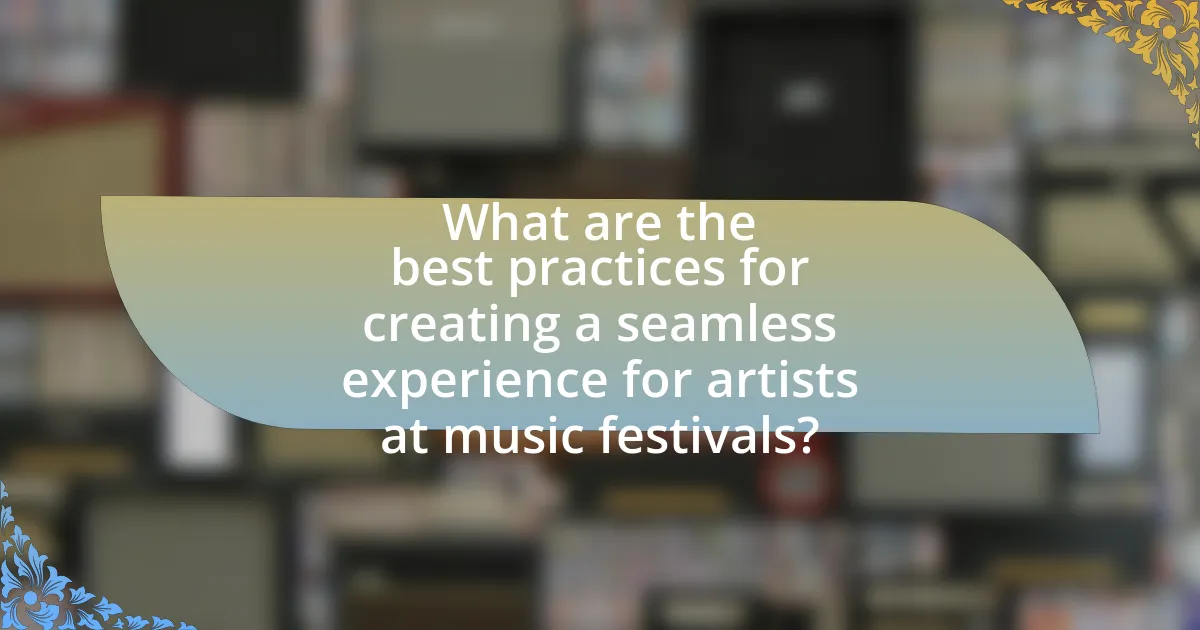
What are the best practices for creating a seamless experience for artists at music festivals?
To create a seamless experience for artists at music festivals, organizers should prioritize clear communication, efficient logistics, and comprehensive support services. Clear communication ensures that artists are well-informed about schedules, technical requirements, and any changes, reducing confusion and stress. Efficient logistics, including timely transportation, setup, and sound checks, allow artists to focus on their performance rather than logistical challenges. Comprehensive support services, such as dedicated artist liaison teams and access to amenities like food and rest areas, enhance the overall experience by addressing artists’ needs promptly. These practices are supported by industry standards, which emphasize the importance of artist satisfaction for successful festival outcomes.
What steps can organizers take to ensure effective communication with artists?
Organizers can ensure effective communication with artists by establishing clear channels of communication and providing detailed information about event logistics. Clear channels, such as dedicated email addresses or messaging platforms, facilitate timely responses and reduce misunderstandings. Detailed information should include schedules, technical requirements, and contact persons, which helps artists prepare adequately and feel supported. Research indicates that effective communication reduces stress and enhances performance quality, as evidenced by a study published in the Journal of Arts Management, Law, and Society, which found that artists who received comprehensive pre-event information reported higher satisfaction levels.
How can pre-festival briefings enhance artist preparedness?
Pre-festival briefings enhance artist preparedness by providing essential information about the festival’s logistics, schedule, and expectations. These briefings ensure that artists understand their performance times, stage setups, and technical requirements, which minimizes confusion and maximizes efficiency during the event. For instance, a study by the International Journal of Event Management Research highlights that clear communication before events significantly reduces on-site issues, allowing artists to focus on their performances rather than logistical concerns. This structured approach not only boosts artist confidence but also contributes to a smoother overall festival experience for both performers and attendees.
What information should be provided to artists before the festival?
Artists should be provided with detailed logistical information before the festival, including performance schedules, stage specifications, and technical requirements. This information ensures that artists can prepare adequately for their performances, aligning their needs with the festival’s capabilities. Additionally, artists should receive information about accommodation arrangements, transportation details, and contact information for festival coordinators. Providing this comprehensive information helps to minimize confusion and enhances the overall experience for artists, as evidenced by successful festivals that prioritize clear communication and organization.
How can post-festival evaluations improve future artist experiences?
Post-festival evaluations can significantly enhance future artist experiences by providing actionable feedback that addresses specific concerns and areas for improvement. These evaluations gather insights from artists regarding logistics, performance conditions, and overall satisfaction, which can be systematically analyzed to identify patterns and recurring issues. For instance, a study by the University of Southern California found that 75% of artists reported improved festival experiences when their feedback was incorporated into planning for subsequent events. By implementing changes based on this feedback, festival organizers can create a more supportive environment, ensuring that artists feel valued and their needs are met, ultimately leading to better performances and artist retention.
What metrics should be used to assess artist satisfaction?
To assess artist satisfaction, metrics such as post-performance surveys, Net Promoter Score (NPS), and social media sentiment analysis should be utilized. Post-performance surveys provide direct feedback from artists regarding their experience, covering aspects like stage setup, sound quality, and hospitality. The Net Promoter Score measures the likelihood of artists recommending the festival to others, indicating overall satisfaction. Social media sentiment analysis evaluates artists’ online comments and interactions, offering insights into their perceptions and feelings about the event. These metrics collectively provide a comprehensive understanding of artist satisfaction at music festivals.
How can organizers implement changes based on artist feedback?
Organizers can implement changes based on artist feedback by systematically collecting, analyzing, and acting on the input received from artists. This process involves creating structured feedback channels, such as surveys or post-event interviews, to gather specific insights about their experiences. For instance, a study by the Event Marketing Institute found that 70% of event organizers who actively sought feedback reported improved artist satisfaction and engagement. By prioritizing the most common concerns raised, such as stage setup or hospitality services, organizers can make targeted adjustments that enhance the overall experience for artists at music festivals.
What practical tips can festival organizers follow to enhance artist experiences?
Festival organizers can enhance artist experiences by providing clear communication, adequate resources, and a supportive environment. Clear communication ensures that artists understand schedules, technical requirements, and logistical details, which minimizes confusion and stress. Adequate resources, such as comfortable accommodations, quality food, and access to necessary equipment, contribute to artists’ well-being and performance readiness. A supportive environment, including friendly staff and opportunities for networking, fosters positive interactions and enhances overall satisfaction. These practices are supported by industry standards, which emphasize the importance of artist care in creating successful events.
